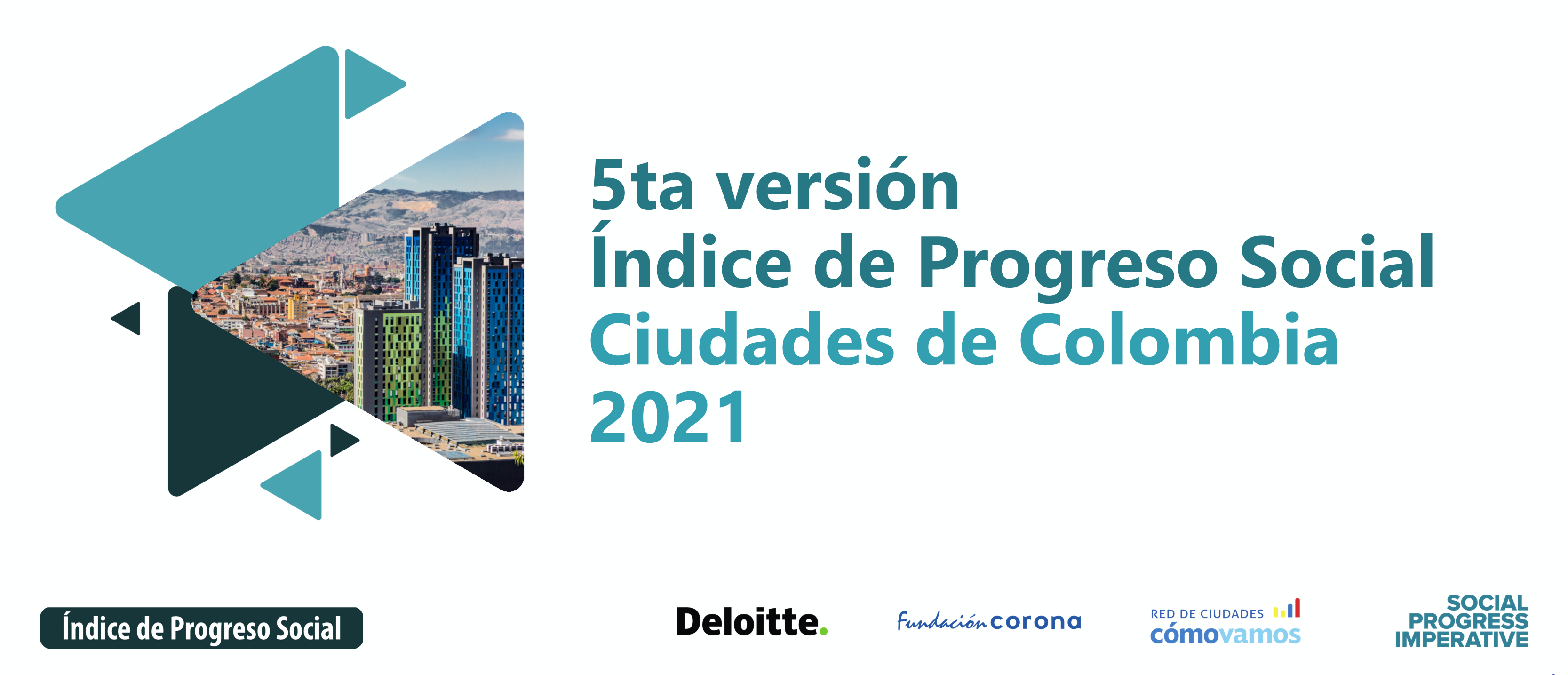
On May 5, the results of the Social Progress Index of the Cities of Colombia 2021 (IPS) were announced. The IPS provides a complementary view of the economic variables of development, allowing the results of government actions and policies to be reviewed through social and environmental indicators.
To learn more about the results of the 5th version of the Cities Social Progress Index - IPS Cities 2021, see:
The index, led by the Corona Foundation, the Network of Cities How We Are Going (RCCV), the Social Progress Imperative and Deloitte, has a three-dimensional structure, each one focused on measuring an essential concept for inclusive growth, as well as 12 components Indicators Thematic indicators made up of 54 indicators, which allow obtaining a granular and multifaceted vision of well-being.
The IPS of the cities of Colombia was born in September 2015 as the first subnational exercise to measure social progress, initially for 8 cities, all belonging to the RCCV. In 2022, the 5th version of the IPS Cities will be delivered with information from 2016 to 2020 and for 15 cities in the country, all of them part of the Network of Cities How We Are Going
“We must understand that the economic growth of a territory is not synonymous with social progress, since economic development is not always social. A country, a region or a city does not generate progress if it does not satisfy the basic needs of its citizens, if it does not generate optimal conditions to improve their quality of life, if it does not protect its environment and if it does not offer opportunities under an equity approach. ”, assured Diana Dajer, Manager of Citizenship of Fundación Corona.
From a general perspective, IPS found that in the 15 cities studied, Social Progress does not necessarily depend on economic growth. Likewise, 14 of the 15 cities have reached significant levels of social progress, which allows them to focus attention on other stages of development beyond basic needs.
In this version of the Index, Manizales continues to lead the results with 77.49 points out of 100, which means that it is the city with the highest development and incidence of social progress in the country. It is followed by Medellín with 70.49 and Montería with 70.47. Cities like Bogotá and Barranquilla are in the middle of the index of 7th and 8th place. Quibdó closes the ranking 54.16, being the city with the most challenges in terms of social progress in the country.
The results of the three dimensions evaluated were:
Basic human needs dimension:
The first dimension assesses basic human needs, such as nutrition, basic health care, water, sanitation, shelter, and personal security. This dimension had an aggregate total of 76.70, where security is the component with the most challenges at the national level, with a result of 61.51. In cities like Bogotá or Medellín, thefts affect the perception of personal security, while in Quibdó it is homicides.
Likewise, the nutrition and basic medical care component, where aspects such as infant and maternal mortality and malnutrition, among others, are evaluated, is another component that requires priority attention, since it had a setback in the general results between 2016 and 2020.
Foundations of Wellbeing Dimension:
The second dimension is Foundations of Well-Being, which assesses access to basic knowledge, access to information and communications, health, well-being, and the sustainability of ecosystems.
For the results of this IPS, the Foundations of Well-being dimension obtained an aggregate score of 63.23. The components of access to basic knowledge and access to information and communications appear as progress markers, with scores of 63.23 and 69.63, respectively. On the contrary, the component that evaluates environmental quality warns about this aspect in cities, with the lowest result of the dimension with a score of 46.98.
Opportunity dimension:
The third dimension is Opportunities, which assesses human rights, personal freedom, free choice, tolerance, inclusion, and access to higher education.
The Opportunities dimension had a total result for the year 2020 of 60.89. The component that has advanced the most in this dimension is the guarantee of freedom and personal choice, obtaining a result of 68.89. For its part, the component of personal rights, which evaluates aspects such as the right to political participation or violence against children, obtained a 65.57.
In this dimension, the inclusion component, which reviews the situation of femicides, respect for people from the LGTBI community, people from ethnic minorities, people with disabilities and those displaced by violence, has great challenges, since it obtained the lowest score with 49.61 out of 100.
“This 5th version of the Cities Social Progress Index shows the panorama of Colombia prior to the impact of the Covid-19 pandemic at the socioeconomic level. The results provide valuable inputs for decision makers in the country, since they not only allow the identification of the challenges faced by cities, but also make a timely diagnosis of the particular needs of each one. The Social Progress Index becomes a fundamental tool not only to recognize the state of social welfare in the regions of the country prior to the Covid-19 crisis, but also to monitor the lags that the pandemic could cause in the standard of living. . of the inhabitants of the cities of Colombia in the coming years” , added Diego Maldonado, Director of the Network of Cities How We Are Going.
The story was originally published here .

Comments